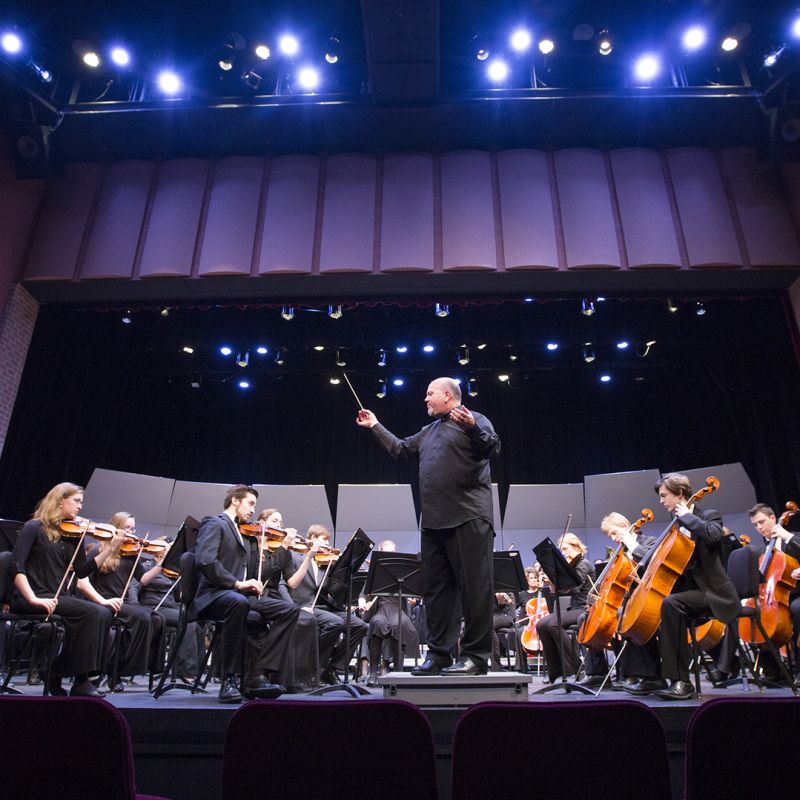Orchestra concerts are always team events. But at the Hillsdale College symphony orchestra’s two spring concerts, four virtuosos will get the chance to shine solo.
Last Monday, the Music Department announced the winners of their annual concerto and aria competition. Out of the 23 hopefuls who auditioned, sophomore violinist Tova Forman and junior mezzo soprano Sarah Schutte were tapped to perform at the concert on March 9, while junior pianist Micah Heinz and junior soprano Katherine Scheu will perform on May 11.
Junior flautist Heather Woodhouse and junior cellist Greg Farison tied for first runner-up.
A concerto is a composition written for solo instrument and orchestra, making it one of the best showcases for individual talent in an orchestral setting. Hillsdale’s orchestra has performed concertos at their concerts since the early 2000s, giving the college’s best virtuosos a spotlight to strut their stuff.

Forman, a student of Professor of Music Melissa Knecht, will perform Bela Bartok’s “Romanian Folk Dances” on the violin.
“I enjoy the challenge of stepping out of the classical, to a degree, and imitating the shepherd’s pipe,” Forman said. “You don’t get that strain of haunting wildness in classical music, I think. The more I play Bartok, the more I want to share him.”
In addition to the technical difficulty, the vocalists will face an extra challenge in their performances: summoning their audience’s emotions with a song plucked from its operatic context.

“You’re still trying to tell a story with the song,” Schutte said. “When people come to the concert, you’ll get program notes, but for the audition you just have to sell it. You know the context that you’re trying to portray, you need to figure out how to portray that emotion, too. You need to pick something, you need to act it out, you need to be that character. It may not be what that scene says, but it’s what you are trying to convey.”
Schutte will sing “Hör’ ich Cymbalklänge,” a “Lied und Csardas” (song and dance) from Franz Lehár’s “Zigeunerliebe” and an aria from Wolfgang Mozart’s “Così fan tutte” entitled “Smanie implacabili.”

Scheu will perform arias from a pair of operas: “Vissi D’Arte” from Giacomo Puccini’s “Tosca” and “Klangë der Heimat” from Johann Strauss’ “Die Fledermaus.” One aria is comic; the other tragic.
“They couldn’t be more different from each other,” Scheu said. “In the ‘Vissi D’Arte,’ the protagonist finds out that her boyfriend’s going to be executed unless she sleeps with this guy, the antagonist. In the second, on a different note, a woman decides that she thinks her husband is cheating on her, so she goes to a party that he’s going to and dresses up as a different woman, to woo him and prove that he’s cheating on her — with her.”
One thing they do have in common with each other and with the other performers’ pieces — they’re hard.
“Both of the songs are total workouts,” Scheu said. “The first one is very controlled … Basically, I hold a super high note for a really long time as loud as I can, and then in the same breath start to decrescendo and come down a couple notes. Then I just hold it there for a long time. So it’s really hard; it takes a ton of control and a very mature voice to sort of master it. I haven’t mastered it yet, but I’m getting close, which is fun.”
Heinz will perform the first movement Camille Saint-Saens’ Concerto No. 5 in F Major, nicknamed “The Egyptian.”

“I first heard the piece in early 2016 when Professor Blackham suggested that I listen to Saint-Saens’ concertos to get ideas for this competition,” Heinz said. “I fell in love with the piece and became immediately obsessed with it. The composer does a masterful job of weaving the piano and orchestra parts together to emphasize the strengths of both, requiring them to depend on each other to create something beautiful.”
Now that the winners have been announced, the performers have a few months to get acquainted with performing with the orchestra — and the orchestra can use that time to learn the music. It’s a process they’re looking forward to.
“I’m really excited about this opportunity to perform with the orchestra,” Heinz said. “I’ve competed in similar competitions before, but never won, so this is definitely a first for me.”

